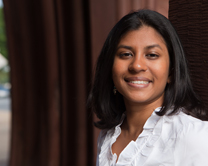At Savannah River National Laboratory (SRNL), Elise Fox works on a wide breadth of projects from fuel cells and batteries to concentrating solar power. She recently took some time to give us the download on advances in energy storage technologies, her ...
February 17, 2011Elise Fox | photo courtesy of Savannah River National Laboratory
Q: What promoted you to pursue a career in science?
Elise Fox: On some level I have always known I would be a scientist. It was just a matter of determining what kind.
Q: At SRNL, you work on materials science and technology. Why did you choose this field?
EF: I knew I wanted to be a chemist since the second day of Chemistry I in high school. After college I also knew I wanted to go a slightly different route than traditional organic, physical or analytical chemistry. So, I found an interdisciplinary materials science graduate program at Penn State where I studied catalysis in various energy applications, particularly focusing on how the properties of a ceramic support and alloying can influence the reactivity of the active metal center.
Materials science is such a vital research area, but is often over looked. I enjoy explaining to people how materials science has made just about every aspect of modern living possible from the semiconductors used in circuit boards to the plastics used to help preserve our foods and the fibers woven in our clothes.
Q: What projects are you working on right now?
EF: I have three different projects right now. One is on the development of ionic liquid nanofluids as heat transfer fluids for concentrating solar power and another is on ionic liquid fuel cell electrolytes. The third focuses on the development of catalysts for batteries. All the work I do focuses on increasing energy efficiency and enabling clean energy technologies. If I can help make even modest performance improvements or inspire someone else to pursue science, I feel as though I have done my job.
Q: That’s quite a wide range of projects. What is your favorite part of your job? What do you envision for these technologies in the next few years?
EF: I love to be in the lab, which is why I chose this profession. Lately, I have actually been enjoying proposal writing. Over the next several years, I expect that we will see some major innovation in batteries and hopefully technologies such as lithium/air batterieswill advance closer to widespread commercial deployment. It is invigorating to see a renewed interest in developing energy storage technologies. This is also a really exciting time in commercial solar energy. Government incentives have enabled groundbreaking on commercial scale concentrating solar power plants, like Ivanpah in the Mojave Desert. I hope that we will continue to see such advancements and incentives.
Q: Did you have a teacher or role model who inspired you to become a scientist?
EF: I had a phenomenal high school chemistry teacher and my dad introduced me to materials science. I decided to combine the best of both worlds.
Q: Do you have advice for students interested in becoming scientists?
EF: Don’t give up. It can be frustrating and difficult, but also very rewarding. Just because you may not like the area of science you are currently studying, doesn’t mean you won’t love another. There are many areas to explore, which are all very different from one another and utilize different skill sets.
Q: What can you never start a day in the lab without?
EF: A mug of green tea while checking my email.
Q: What is your favorite tool in the lab?
EF: All kinds of glassware. I don’t think it is possible to ever have too much. I recently got an automated rotary evaporator (aka rotovap), which has been a lot of fun.
Q: Who is your favorite fictional scientist?
EF: Hermione Granger. With Potion skills like hers, you can’t deny that she is a natural born chemist.
Q: Last question, what do you enjoying doing in your free time?
EF: Dancing with a local dance company. Right now, I mainly perform contemporary, but I have a background in tap, jazz and ballet.
Find out more about Dr. Fox and other Savannah River National Lab projects at http://srnl.doe.gov.


